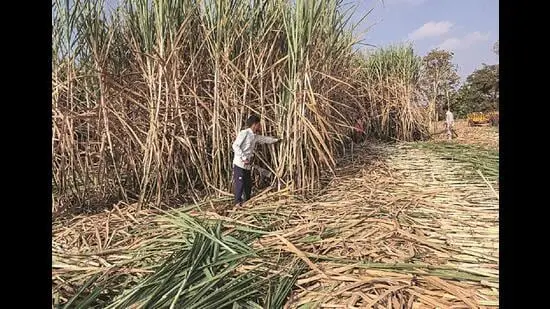
Sugarcane farmers based along the Karnataka-Maharashtra border are increasingly directing their harvest to mills across state lines, drawn by higher procurement prices and long standing grievances with local factories.
Official records from the Karnataka State Sugar Research Centre in Belagavi indicate that more than 25,000 farmers from the Kittur Karnataka region each year to mills in Kolhapur district in Maharashtra already, with mills in Hemaras, Harali, Hamidwadi. Shahu, Datt, Gurudatt and Panchaganga crushing a collective harvest of over 100,000 tonnes annually.
Amid protests by farmers in Belagavi and Bagalkot over a demand for a hike in the MSP of sugarcane, the state government recently announced a revised rate of ₹3,300 per every tonne sold, but many farmers in Belagavi and Bagalkot districts expressed their dissatisfaction with the revised rate, citing the prevailing rate in Maharashtra, which is higher by around ₹300.
Under pressure, the government held separate meetings with growers and mill owners before announcing the revised procurement price of ₹3,300 per tonne on November 7. The decision prompted mixed reactions.
According to Siddagouda Modagi, president of the Karnataka Sugarcane Growers Association, which was at the forefront of the recent protest, farmers have been dealing with long-standing issues of alleged manipulation of cane weight and delayed payments in instalments, eroding trust in local factories. “Maharashtra maintains fair business practices and ensures clear, timely payments within 15 days of sale,” he said.
Modagi added that the problem has deepened because mills in Belagavi failed to match Maharashtra’s more aggressive pricing. While factories across the border are offering significantly higher sums, local mills have been reluctant to provide even ₹3,500 per tonne, he said.
Once regarded as the sugar bowl of Karnataka for its high levels of cultivation and crushing, Belagavi now faces mounting dissatisfaction among growers. Several farmers say that while mills in the district promise assistance, such as cutting and transport of cane at no cost, they fail to ensure timely payment. Many of the nearly 30 mills in the district are linked to political leaders.
Protests intensified last week, with demonstrations and road blockades across Belagavi and Bagalkot. In Bagalkot, tensions escalated when more than 50 tractor loads of cane waiting inside the Godavari Sugar Factory premises were set ablaze by unidentified individuals.
Meanwhile, farmers’ concerns have deepened as Maharashtra mills announce higher prices. Bidri Sugar Factory has declared ₹3,614 per tonne, Dalmia Bharat Sugars is offering ₹3,525, and Bhogavati Sugar Factory has announced ₹3,653 per tonne, the highest so far.
Modagi said much of the price gap comes down to recovery rates, which determine how much sugar can be extracted from cane. “Maharashtra’s average recovery stands at around 13%, enabling mills to offer higher procurement prices. Additionally, cane is supplied to mills for nearly 14 months in Maharashtra, compared to about 8 months in Belagavi. In contrast, Belagavi records an average recovery of just 11%, restricting mill owners willingness to increase prices,” he said.
Former legislator Muragesh Nirani, who heads the Nirani Group that operates four mills including Nirani Sugars Limitedsaid prices in Bagalkot and Belagavi remain lower because cane recovery is consistently below that of Maharashtra.
Choonappa Poojari, state president of the Karnataka Rajya Raitha Sangha and Hasiru Sene, said the economic gap was driving farmers to reconsider where they sell their cane. “The shift towards Maharashtra mills is a practical choice for farmers seeking fair compensation,” he said.
.
